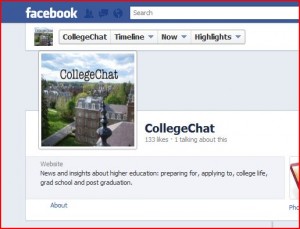Professor Rey Junco will discuss recent research on college students’ Facebook use #CollegeChat on June 5, 2012 at 9 p.m. Eastern
 Dr. Rey Junco, professor at Lock Haven University and a youth and media lab mentor at the Berkman Center for Internet & Society at Harvard University, will discuss his latest research on the relationship between Facebook use and college student engagement on #CollegeChat June 5, 2012 at 9 p.m. Eastern.
Dr. Rey Junco, professor at Lock Haven University and a youth and media lab mentor at the Berkman Center for Internet & Society at Harvard University, will discuss his latest research on the relationship between Facebook use and college student engagement on #CollegeChat June 5, 2012 at 9 p.m. Eastern.
During #CollegeChat, Junco (http://twitter.com/reyjunco) will discuss research findings from a recent study he authored “The relationship between frequency of Facebook use, participating in Facebook activities, and student engagement” with attendees including:
- Is there a relationship between frequency of Facebook use and activities and student engagement?
- Is there a relationship between frequency of Facebook use and activities and time spent preparing for class?
- Is there a relationship between frequency of Facebook use and activities and time spent in co-curricular activities?
- Why are these results important for higher education administrators, faculty and staff important?
- Why is it important for higher education to design and support interventions that meet students where they are on Facebook and other social media sites?
Rey Junco is a social media scholar who investigates the impact of social technologies on college students. Rey’s primary research interest is using quantitative methods to analyze the effects of social media on student psychosocial development, engagement, and learning. His research has also focused on informing best practices in using social technologies to enhance learning outcomes. For instance, Rey’s research has shown that technology, specifically social media like Facebook and Twitter, can be used in ways that improve engagement and academic performance. Rey has recently published papers on: the relationship between Facebook use, student engagement, and learning, the academic effects of multitasking, the digital divide in cell phone ownership and use, using social media to promote civil discourse on college campuses, and how Twitter can be used for academic purposes in order to increase student engagement and improve grades.
About #CollegeChat
#CollegeChat is a live bi-monthly conversation intended for teens, college students, parents, and higher education experts on Twitter. #CollegeChat takes place on the first and third Tuesday of the month at 6 p.m. PT/ 9 p.m. ET. Questions for each #CollegeChat edition can be sent to Theresa Smith, the moderator of #CollegeChat via http://Twitter.com/collegechat, by entering questions online on the CollegeChat Facebook page or by email. More detailed information about signing up for Twitter and participating in #Collegechat can be found at http://pathwaypr.com/how-to-participate-in-a-twitter-chat .
